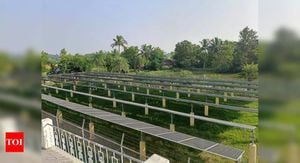The British farming community finds itself at the center of heated debate and protest following recent budget changes proposed by Chancellor Rachel Reeves. Farmers across the UK are expressing their outrage over new inheritance tax rules, which will subject farmland worth more than £1 million to a 20 percent tax, set to take effect from 2026. This move has stirred up significant unrest within the agricultural sector, as many farmers warn it could threaten the viability of family farms, force sales of agricultural land, and contribute to rising food prices.
On Saturday, as Prime Minister Keir Starmer addressed the Welsh Labour Conference, hundreds of farmers took to the streets outside to voice their discontent. Many drove tractors to the venue, with chants and banners calling for the government to reconsider the tax changes. During his speech, Starmer defended his government’s fiscal decisions—and the budget measures he supports—without directly addressing the farmers' grievances.
“Make no mistake, I will defend our decisions in the budget all day long,” Starmer stated. His remarks have done little to quell the frustration among farmers, who feel their concerns are being dismissed. Gareth Wyn Jones, a vocal farmer and regional agricultural leader, condemned Starmer’s absence following the speech, criticizing the Prime Minister for failing to engage with the very people impacted by his policies. "It’s so frustrating to see him run out the back door like a flipping rat when people have come here to talk to him," Wyn Jones commented.
The threat of future protests looms large. Farmers have announced plans for mass demonstrations, including one set for November 19th, aimed at bringing attention to their plight and the potential repercussions of the inheritance tax changes. Many farmers fear they could be forced to sell off parts of their land or, worse, entire farms, jeopardizing not only their livelihoods but also food security across the nation.
Meanwhile, critics of the tax changes have pointed out the wider economic impacts, warning of inflationary pressure it could create. UK businesses have expressed concerns about the overall tax burden increasing, noting the compounding effects of rising employment taxes and the minimum wage hikes introduced under the budget policies.
The reaction from the public has ranged from supportive of the farmers’ plight to those who echo sentiments from some commentators blaming farmers themselves for their current struggles. Broadcaster Matthew Wright, during his radio show, suggested farmers are to blame for their predicament due to their previous support for Brexit, which he argues has left the UK worse off. “Most farmers voted for Brexit,” he remarked, implying their political choices have direct consequences on current financial policies. This assertion has sparked outrage, with many farmers asserting they should not be scapegoated for decisions made years ago.
Despite the backlash, some government ministers have defended the budgetary measures. Transport Secretary Louise Haigh has assured the public and farmers alike, stating the government is preparing for potential food shortages against the backdrop of declining agricultural output driven by the proposed tax changes. Haigh mentioned, "Defra will be setting out plans for the winter... food security is treated as the priority it deserves."
During this wave of protests, the leadership within the National Farmers’ Union (NFU) has taken a measured approach. NFU President Tom Bradshaw stated he does not endorse extreme measures such as withholding food supplies as protest tactics. He empathized with the feelings of helplessness many farmers experience but emphasized the need for constructive dialogue rather than confrontational strategies.
The controversy surrounding the inheritance tax is not solely economic; it also taps deeply at the heart of British identity and the farming community's heritage. Farmers argue their family-run businesses are part of the fabric of rural life and heritage, often passed down through generations. Many fear their legacies are at risk as they grapple with planning for the future amid heightened financial uncertainties.
This situation reflects broader tensions within the UK surrounding economic policy, taxation, and the livelihoods of rural communities. While the government insists the adjustments are fair and necessary, farmers continue to rally against what they perceive as punitive measures targeting their families’ futures.
Conversations around inheritance tax and farming will likely remain contentious as farmers escalate their protests, with potential flashpoints arising as they converge on Westminster next month. The question remains—how will the government navigate this growing discontent and what changes might ensue if they respond to the farmers' demands? The outcome of this dispute could shape the future of British agriculture for years to come as the balance between economic policies and the livelihood of farmers strives for equilibrium.



